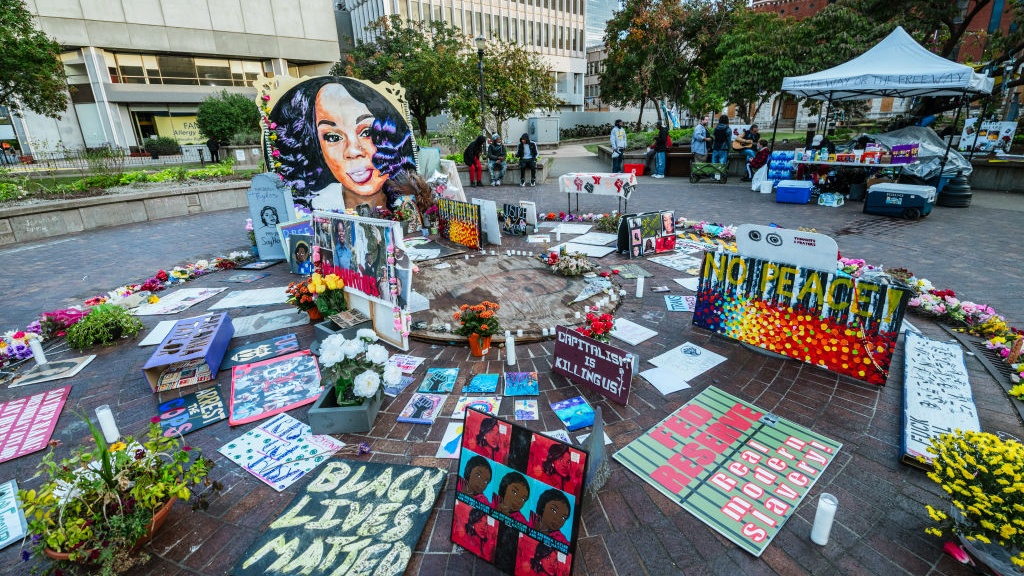On the night of March 13, EMT Breonna Taylor would join Aiyana Jones, Philando Castile and countless other Black people whose killings at the hands of law enforcement would go unrebuked.
The devaluing of Black lives is far from being a new phenomena — if anything it's informed by a history which achingly repeats itself. Taylor's killing is no different. But the pardoning given to her killers in particular, bears a striking resemblance to a slavery-era law which justified the killings of Black people.
The Casual Killing Act of 1669 permitted any slaver, or white person, to legally murder an enslaved African without consequence when the death were to occur during the execution of punishment per PBS' Thirteen.Org.
"Should a slave be killed as a result of extreme punishment, the master should not face charges for the murder," the site states of the law.
Such a policy was supposed to end with the abolishment of slavery. But when Kentucky Attorney General Daniel Cameron deemed Taylor's killing justified because shots fired at her were in response to her boyfriend shooting at cops, Oscar-winning actress Viola Davis drew attention to an eerie correlation between The Casual Killing Act and the AG's decision not to directly charge officers in her killing.
“We are our history,” read the caption. “I knew I read some older version of this 'wanton endangerment' loophole somewhere before.”
“And if any slave resist his master, or owner, or other person, by his or her order, correcting such slave, and shall happen to be killed in such correction, it shall not be accounted felony; but the master, owner, and every such other person so giving correction, shall be free and acquit of all punishment and accusation for the same, as if such accident had never happened,” reads the first half of the law according to Converging Worlds: Communities and Cultures in Colonial America, A Sourcebook.
“And also, if any negro, mulatto, or Indian, bond or free, shall at any time, lift his or her hand, in opposition against any christian, not being negro, mulatto, or Indian, he or she so offending, shall, for every such offence, proved by the oath of the party, receive on his or her bare back, thirty lashes, well laid on; cognizable by a justice of the peace for that county wherein such offence shall be committed,” it concludes.
In late September, Cameron announced only one of the three officers would be charged and that the charges would be those of wanton endangerment for shooting into the apartments of Taylor's neighbors. It's worth noting only the apartments with white occupants were listed in the charges, although the home of a Black neighbor had also been fired into.
The September 23 announcement made it evident that in the eyes of the law, no such killing ever did take place. Almost like "no such accident ever happened." The court deemed Taylor's life so inconsequential her murder was made a footnote at its own trial.
The saying goes that history repeats itself. The similarities to the Casual Killing Act are obvious; Black persons, Taylor and her boyfriend Kenneth Walker, were stalked and had their homes violated. Walker was punished for raising his "hands in opposition."
Today's police are born from slave patrols, white male volunteers who doggedly policed the whereabouts and potential uprisings of those enslaved, often breaking into homes and destroying property in the process.
The introduction of Breonna's Law and the city's $12 million settlement with Taylor's family would follow the devastating killing. But true justice proved elusive — like with too many other sanctioned stolen Black lives.
But Taylor's case isn't the only in which correlation can be found between the Casual Killing Act and present-era unrebuked police shootings.
Take the killings of Jones, Castile, Jonathan Price, Rayshard Brooks, Dijon Kizzee and Trayvon Martin — whose killer now makes lucrative public appearances and occasionally sells artwork to adoring fans for upwards of $100,000.
At present, the public still awaits the outcome for the killers of Ahmaud Arbery, a 25-year-old Black jogger who was accosted by three shotgun toting white men who ran him down in a pickup truck, and Atatiana Jefferson, a 28-year-old Black woman who was shot through the door by Texas police while playing video games with her nephew. It took several months for Arbery’s killers to be charged as Glynn County authorities insisted several times that no crime had been committed.
Should these families see no justice, like the countless Black families before, it should be noted that this isn’t an anomaly.
History lends itself to the notion that Black life being willfully and negligently taken isn’t just an accident, it appears to be a legal right woven into the very first laws of the country.
